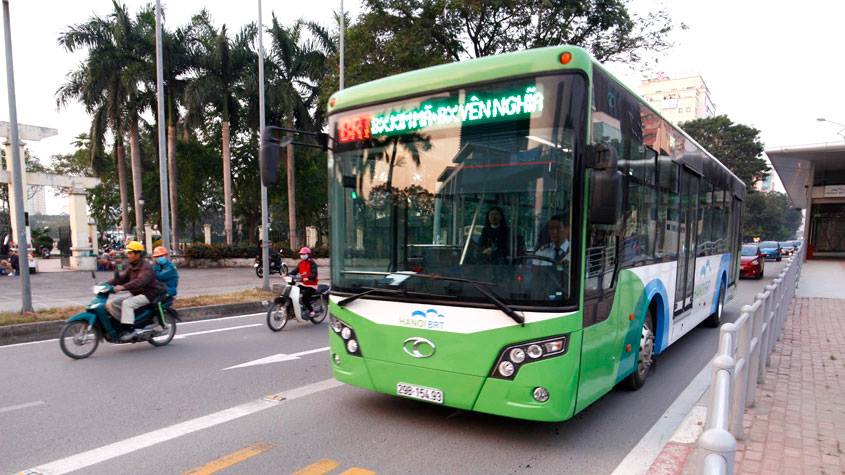State inspectors have revealed multiple violations by the developer and contractors of the first-ever BRT (Bus Rapid Transit) project in Hanoi, which resulted in hefty losses to the state budget.
The 14.7km, 21 station BRT corridor, was planned as part of the capital’s urban transport development project, with the municipal Department of Transport being the developer, according to state inspectors.
The project was initially expected to cost US$53.6 million, financed through World Bank loans.
While the Hanoi administration approved the BRT development in 2007, construction was not started until six years later.
It eventually took three more years for the BRT route, connecting Kim Ma Station in Dong Da District and Yen Nghia station in Ha Dong District, to be put into operation on the very last day of 2016.
An amount of VND657.5 billion ($28.27 million) was already paid upon its launch, whereas the unpaid payment for the whole transit bus system is more than VND706 billion ($30.36 million).
The project is meant to help tackle the chronic traffic problems in the capital.
Whether the costly BRT is an effective investment is still a question, but in the short run, heavy losses to the state budget by a number of violations has been reported following an inspection into the project.
Travel broadens no mind
During the time of its construction, the Hanoi BRT project received the most intensive World Bank consultant and staff expert, compared to any projects of its kind in Asia and possibly the world.
Hanoi People's Committee sent three delegations of officials to Brazil, Colombia, Ecuador, and Indonesia in 2004, 2009 and 2015 to study their BRT models.
However, after returning from the study trips, those officials only gave little to no contribution to all stages from the earliest project conception through to its operation, according to the inspectors.
Particularly, one delegation did not report the results of their trip, while two other delegations reported what was not related to what they were supposed to do.
“The teams sent out [for study purpose] did not acquire any reference to participate in, contribute to the formulation, design, cost estimation of the BRT project, failing to meet the objectives of the survey [trips],” the state inspectors specified.
The state inspectors reported that the very-first stages of preparing and approving the bidding plan from 2008 to 2014 even lacked synchronization, the scale of the package was not reasonable and had to be amended several times.
The contract was thus delayed according to the approved plan, resulting in violations of the bidding law.
Hefty losses
Inspectors also found out that the BRT developer intentionally listed extra costs of mobilizing and dissolving the construction site, which should have been included in the direct and general expenses in the estimation of seven packages for the construction and installation of the BRT project.
The overlapped costs violating the Circular 04 issued by the Ministry of Construction in 2010, causing a loss of more than VND0.33 billion ($14,190) to state budget.
In addition, the developer has added equipment to one of the packages in the construction without organizing a bid, but signed the contract addendum with the contractor.
The developer also paid the contractors some expenses in excess of the signed contract of VND206 million, or $8,858 million losses to the state budget.
At the BRT link at Kim Ma station, whose contractor is the joint venture of Gia Long Construction Joint Stock Company and Hong Ha Vietnam Joint Stock Company, the state inspectors determined the lost and wasted amount of nearly VND5 billion ($215,000).
Likewise, the bidding links of the rapid bus routes from Ministry of Health on Giang Vo Street in Ba Dinh District to Khuat Duy Tien Street in Thanh Xuan District, and from Khuat Duy Tien Street to Yen Nghia bus station unnecessarily cost the state budget more than VND15 billion ($645,000).
In the first half of 2017, the average number of BRT passengers was 39.9 people per trip, only 44.3 percent of its designed capacity of 90 persons per trip, according to a report by the transport department.
Even during rush hours, the occupancy rate is only 75.4 percent of capacity. Despite this poor performance from the maiden BRT route, a second line is planned for development.




















































